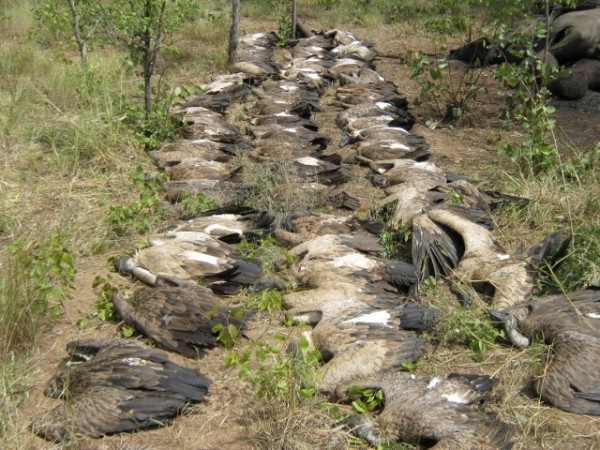| You are at Toxics Alert > Report > Elephant Poachers Poison Hundreds of Vultures to Evade Authorities | |||
 |
 |
||
|
Subscribe || Tell a Friend || Print View | ||
| Home | Editorial | Feature | Interview | News | Policy | Updates | Reports / International News | Partner | |||
|
|
Previous Article | Next Article Elephant Poachers Poison Hundreds of Vultures to Evade AuthoritiesSource: National Geographic, Date: , 2020The
ongoing slaughter of Africa’s elephants is at record levels. The
situation has gotten out of hand in many countries, especially those lacking
the resources to fight the increase in demand for ivory from the Far
East.Poachers lace the discarded elephant carcass with cheap poisons to kill
vultures in mass. Why? Because vultures circling in the sky alert
wildlife authorities to the location of poachers’ activities. With wildlife
authorities struggling to save the remaining tuskers, there has been little
attention paid to the other casualties of elephant poaching. In what is
now becoming commonplace across the continent, poachers lace the discarded
elephant carcass with cheap poisons to kill vultures in mass. Why?
Because vultures circling in the sky alert wildlife authorities to the location
of poachers’ activities. Vultures are highly specialized to locate
carcasses quickly so as to avoid competition from larger mammalian predators.Â
Poachers would prefer their nefarious activities to remain undetected to escape
arrest. So to a poacher capable of gunning down a 7-ton beast, poisoning
several hundred vultures along the way is all in a days’ work. And if
recent reports are anything to go by, many of Africa’s 11 species of vulture
are in imminent danger of extinction. In July this year up to 600
vultures died at a single elephant carcass that was poisoned near Namibia’s
Bwabwata National Park. There have been three other similar incidents in
the wider region since the end of 2012, with each incident killing hundreds of
vultures. White-backed vultures poisoned at
an elephant carcass. Photo courtesy of Gonarezhou Transfrontier Park. Vultures
are long-lived birds that reproduce very slowly, producing an average of one
chick every other year. Their current mortality rates are well above what
is sustainable and populations of all species are crashing across the
continent. And if you don’t love vultures, you should. They are nature’s most efficient and effective clean-up crew. They go about their daily business without any fanfare. Yet, in their little appreciated role, they are ensuring that our increasingly polluted planet remains a bit less polluted from the bacteria and other pathogens that accumulate on carcasses and at garbage dumps. If you have ever seen the immaculately cleaned bones remaining from a carcass scavenged by vultures, you’ll know of the magic of these supremely adapted scavengers. |
•
Home •
FEATURE •
INTERVIEW •
NEWS •
POLICY •
UPDATES •
REPORTS / INTERNATIONAL NEWS •
